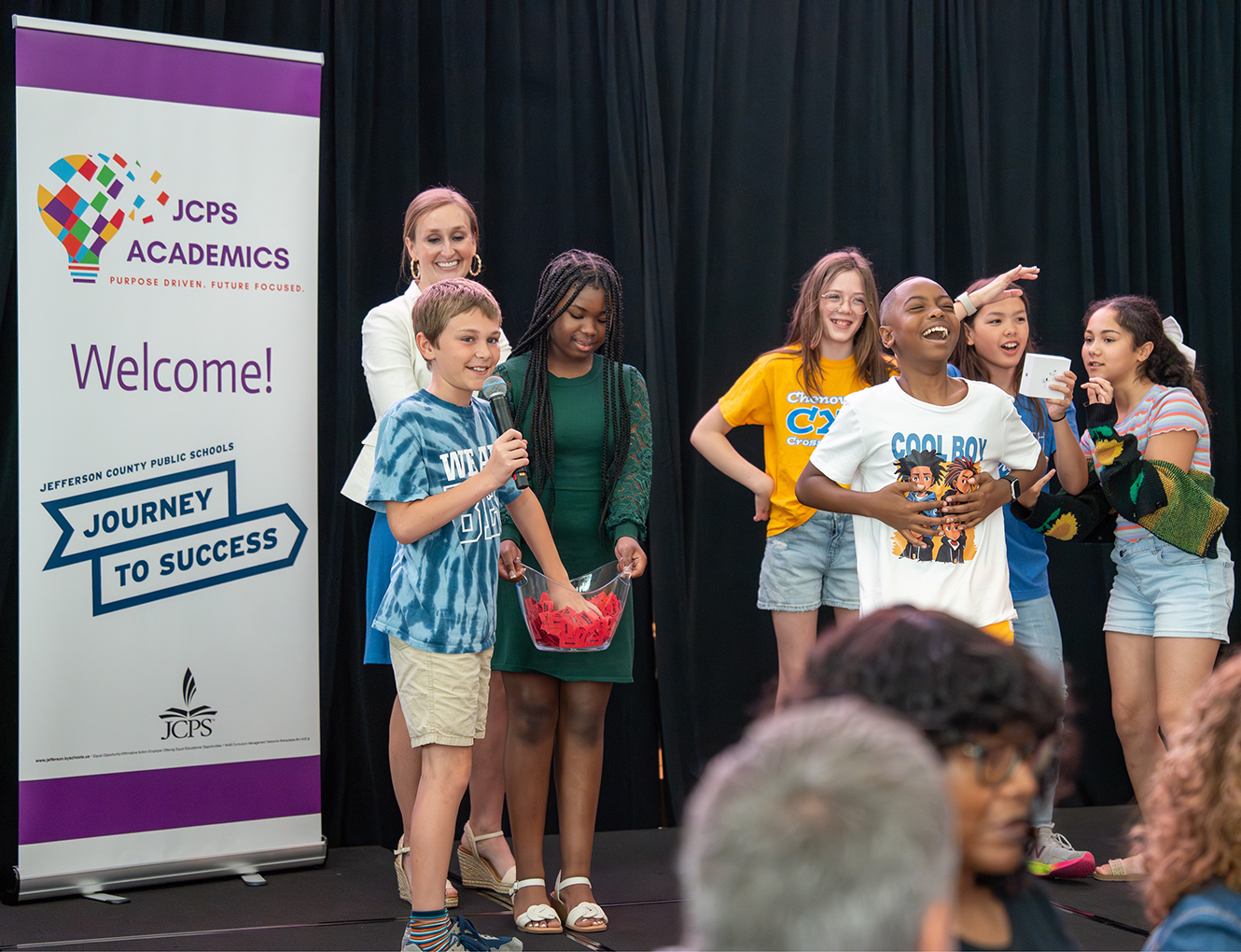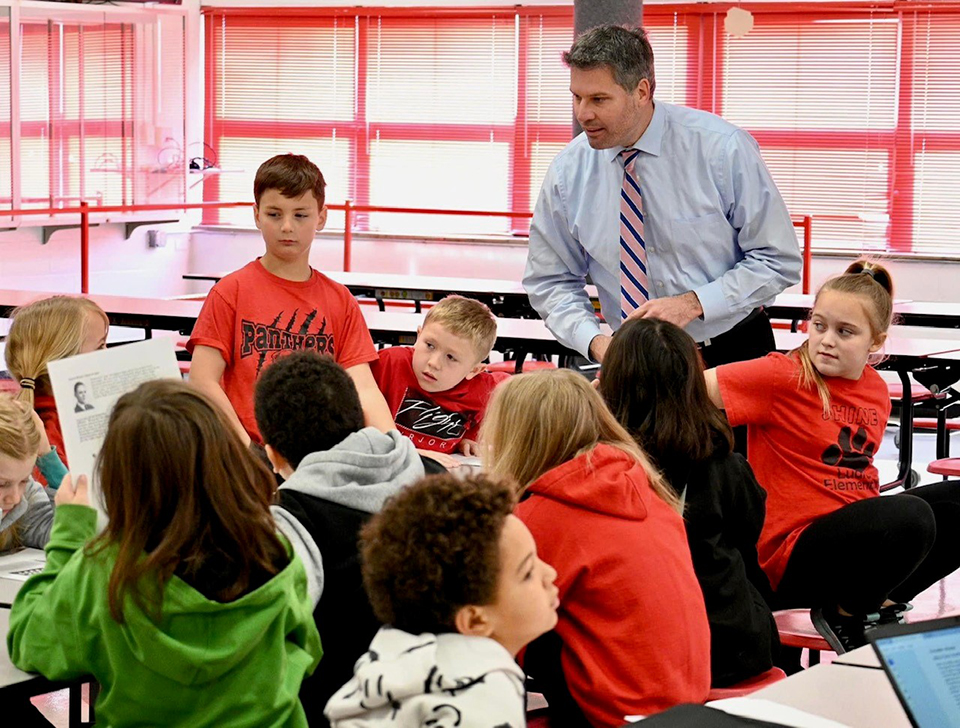susan.riddell@education.ky.gov

Education recovery specialists Rick Larson and Pebbles Lancaster and guidance counselor Angie McGee meet with other leadership members during their first meeting of the school year at Livingston Central High School (Livingston County).
Education recovery specialists (ERS) are expected to figuratively roll up their sleeves and get to work helping schools improve. But ERS Pebbles Lancaster will tell you they do that literally, too.
Arriving at a persistently low achieving (PLA) school, Lancaster and her state team noticed the school was in need of a physical makeover.
“As a team, we rolled up our sleeves, painted rooms, scrubbed lockers and cleaned gunk off stairs,” Lancaster said. “Our goal was to make our building inviting and to bring back that pride that had existed before.”
Just as important, the effort showed teachers and administrators that she was there to help.
“We were at their service,” she said, “willing to do anything to assist their school, even if it meant getting our hands dirty and paint everywhere.”
The effort helped Lancaster and her team – and their services – earn acceptance in the district, she said.
“It also got individual teachers and the staff as a whole to work as a team to change the appearance of their building to one of a higher standard,” she added.
Lancaster is one of roughly 80 ERS across the state. These recovery specialists facilitate change and improvement in persistently low achieving (PLA) schools.
“Each school is different, but our goal as an education recovery staff is to be gone and for the school we leave to be an effective learning environment for school students,” said Susan Allred, interim associate commissioner for the Office of Next-Generation Schools and Districts.
Allred said initiatives like cleaning schools serve a greater purpose for recovery specialists.
“You have to have adequate instruction in the classrooms, and there are some key characteristics of that, like bell-to-bell instruction and targeted interventions that recovery specialists deal with,” she said. “But culture/climate is a piece of that also. Anything that leads to that effective learning environment is important, and a lot of times what helps lead to that comes from matters involving school culture/climate.”
Lancaster and other team members have sponsored a program in past years that targeted stronger school culture when they ran Project Princess. This program focused on high school proms and making them more affordable for students.
Lancaster’s team worked with stores that donated dresses and tuxedos or gave students discounted prices.
“Students were able to sell their dresses to their peers in our school store,” she said.
Floral businesses donated boutonnieres and corsages, hairdressers offered free hair up-dos, and makeup consultants donated their time and products for makeovers.
“Basically, all services were free for anyone who wanted to participate,” Lancaster said. “The program has been a huge success for the past two years and has been adopted by the family resource center as one of its high school initiatives. Also, due to word of mouth, several other schools have inquired and set up similar Project Princess designs in their home counties.”
Debra Reed served as an ERS at Valley High School (Jefferson County) the last two years, but is now at Knox Central High School (Knox County). She said while at Valley High recovery specialists worked to build a culture of high academic and behavior expectations.
Teacher trainings were paramount, she said.
“We began this initiative by training the teachers on Highly Effective Teaching and Learning, Educational Planning and Assessment System (EPAS), the Kentucky Core Academic Standards, ACT Quality Core, rigorous and relevant instruction and professional learning communities (PLC),” Reed said. “The training and ongoing support was provided through our PLCs, ‘Lunch and Learns,’ professional development sessions and new teacher meetings.”
Allred said recovery specialists are responsible for developing and implementing 30-, 60- and 90-day plans at the PLA schools. “The big thing I tell these folks when I meet them is it’s not about us,” she said. “It is about children and what the schools need to meet the needs of children.”
Reed sees her overall ERS goal as increasing student achievement and ensuring students are college and career ready. Her role, she said, is to assist and support administrators and teachers to improve instruction and student learning throughout the building with an intentional focus on literacy.
“I accomplish this through many avenues,” Reed said, “alignment of curriculum to state standards, creation and use of quality formative and summative assessments, analysis of student data, implementation of professional learning communities, development and implementation of research-based instructional practices and provision of professional development opportunities.”
Lancaster said she plans to implement several college- and career-ready initiatives this year at Livingston Central High School (Livingston County). She said students will be able to count on her for “anything and everything to provide the best high-quality education available through means of effective instruction and high quality teachers.”
With the new school year underway, Allred said she wants to see recovery specialists and PLA schools better connect to resources provided by educational co-ops and universities.
“I also think the education recovery specialists are going to network more because the hope is that when they are no longer in a school, that school will have hardwired improvement systems they can share with other (PLA) schools,” Allred said. “And so we are trying to have better opportunities for ERS to network in order to see what best practices are and to share from school to school.”
That’s been difficult in the past because recovery specialists are so focused on improvement in their school, they don’t get collaborative opportunities with other on a regular basis, she said.
“Our goal is to have them in the building all the time,” Allred said. “We don’t spend a lot of time out, but we’re trying to use communication tools to enable connections between the schools.”
Schools need ERS because of the perspective they offer, Lancaster said.
“Sometimes people only see what they want to see, and they view the world through that narrow spectrum of what they have always known or been told,” she said. “However, to grow and learn, we must constantly reflect and strive to do better. Sometimes, we are too close to the situation and need to step back and let another set of eyes analyze and assist us with their means.”
With so many hats to wear as an ERS, Reed said her favorite days are the ones when she can simply observe and work with teachers in the classroom.
“This allows me to not only provide support to teachers, but also gives me opportunities to work with students,” she said. “While in the classroom I am able to observe the teacher at work, and then during the teacher’s planning period we can discuss what took place. This one-on-one conversation gives the teacher time to reflect on his/her craft. Together we discuss the teacher’s strengths and identify an area the teacher may want to improve or identify an instructional strategy the teacher may want to try next.”
The time in the classroom also allows Reed to work directly with students. “This time is invaluable because it allows me to see what skills students are mastering and what skills we as a teaching team still need to focus,” she said.
MORE INFO…
Susan Allred, susang.allred@education.ky.gov, (502) 564-5130, ext. 4001
Pebbles Lancaster, pebbles.lancaster@education.ky.gov, (270) 928-2065
Debra Reed, debra.reed@education.ky.gov, (606) 546-9253



Leave A Comment